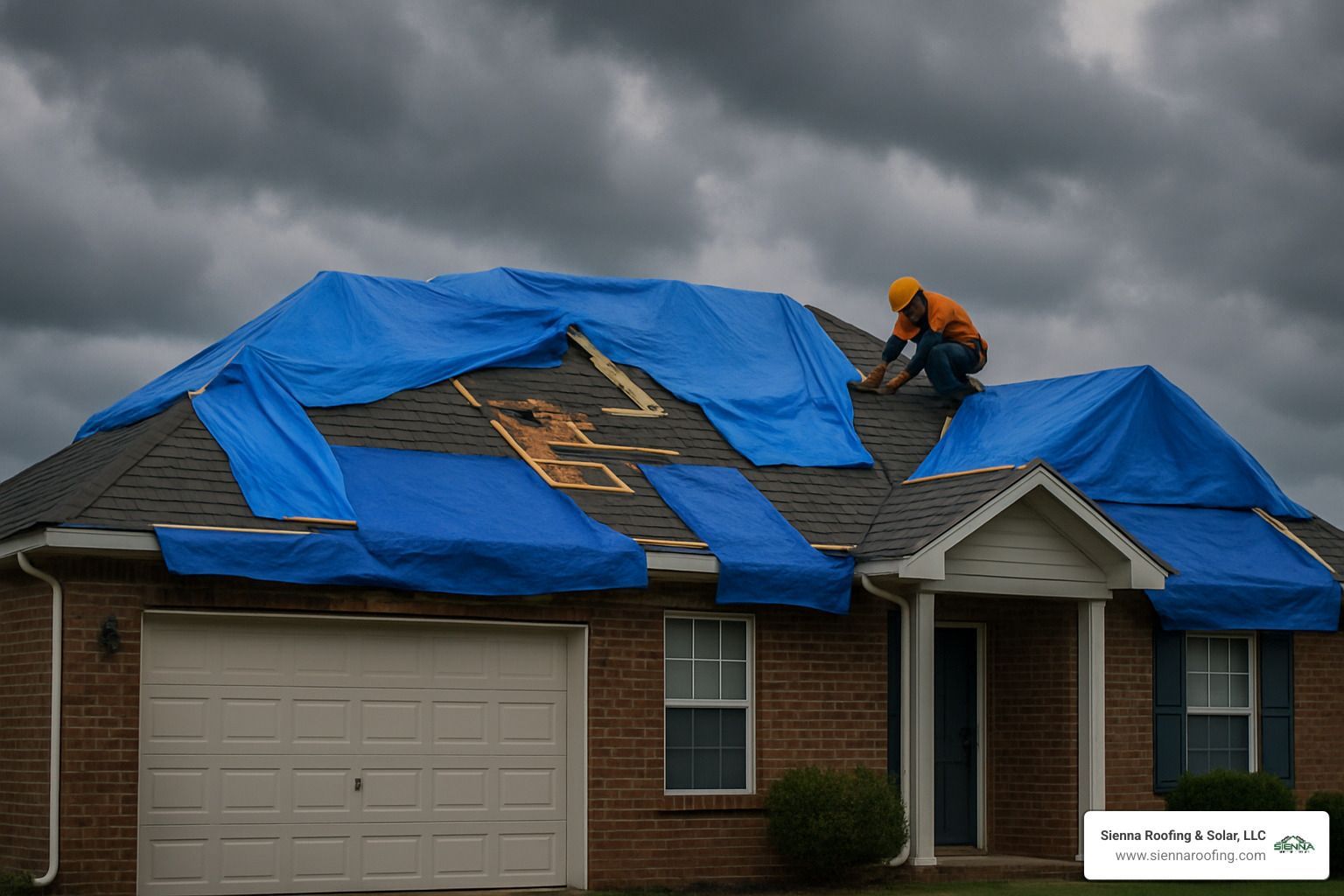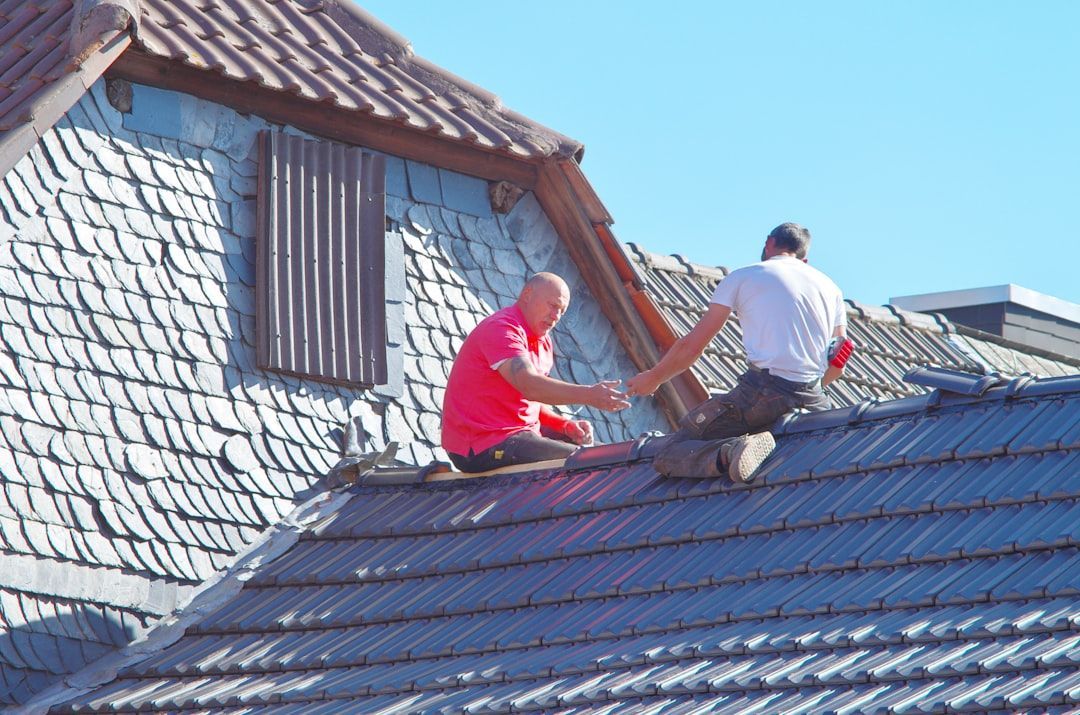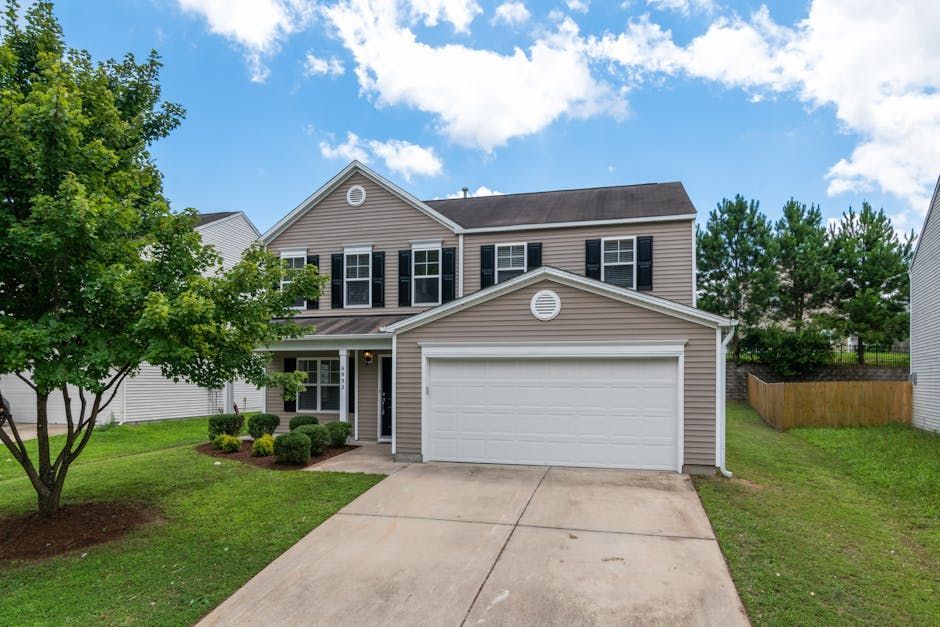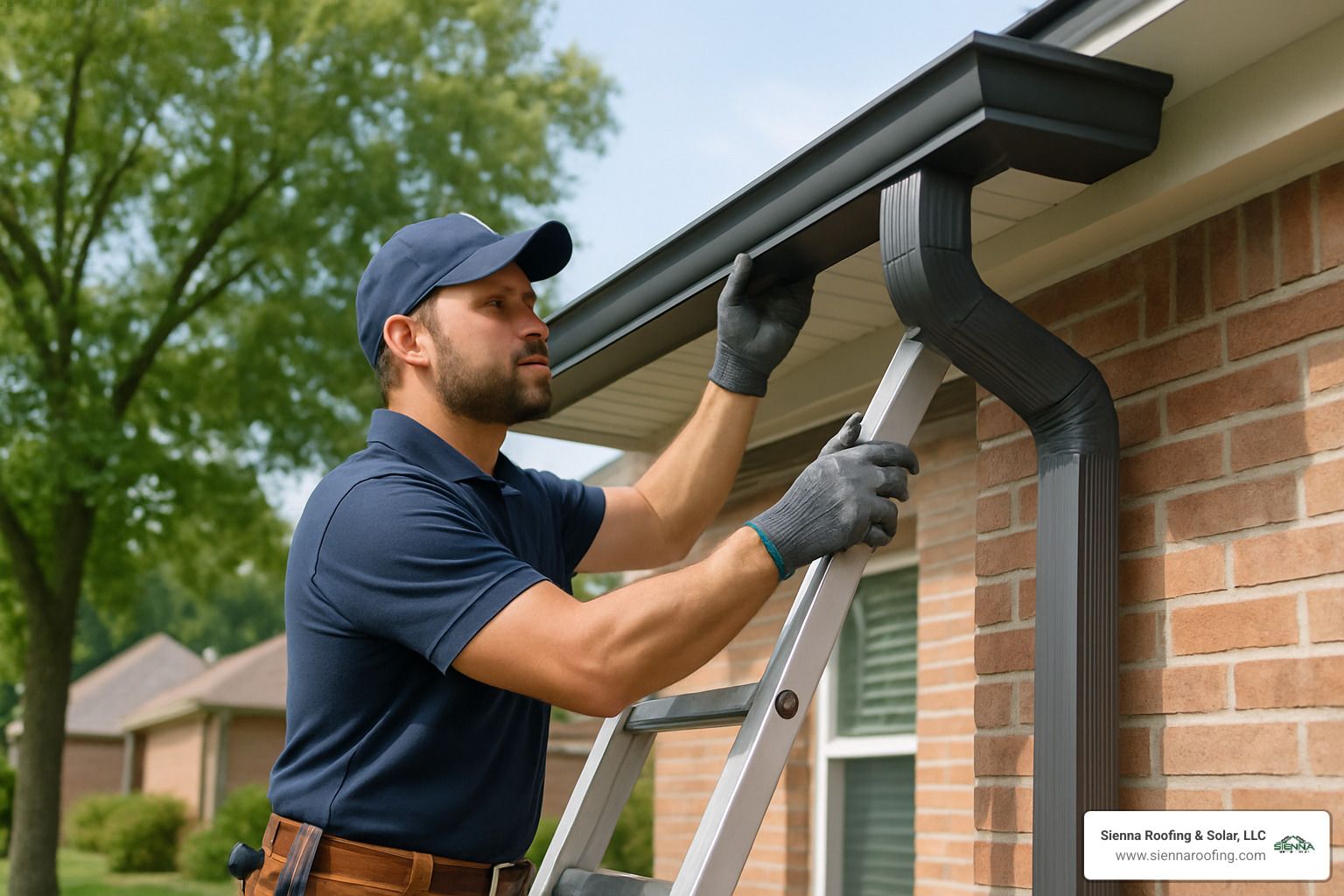Roof Spread Got You Stressed? Here's the Cost Breakdown

Andre Castro
Owner of Sienna Roofing
Understanding the Financial Impact of Roof Spread Repairs
The cost of fixing roof spread varies dramatically based on the severity of the problem, ranging from under £500 for minor restraint improvements to £30,000 for comprehensive structural repairs including re-slating and wall reconstruction.
Quick Cost Breakdown:
- Structural engineer assessment: £500-£600 + VAT
- Minor repairs(joist restraints, rafter strengthening): Up to £500
- Major structural work(full remedial repairs, re-slating): £10,000-£30,000
- Localized bay window repairs: Variable, but significantly less than full remedial work
Roof spread happens when your roof's weight pushes the supporting walls outward. This creates a domino effect - cracked walls, damaged bay windows, and potentially dangerous structural issues. The problem often starts when homeowners replace original slate tiles with heavier concrete alternatives, or when ceiling joists lose their ability to tie the structure together.
Why costs vary so much: Minor cases might only need additional restraints at ceiling level. But severe spread can require completely rebuilding wall sections, installing new tie systems, and reverting to lighter roofing materials.
As Andre Castro, CEO of Sienna Roofing & Solar with over five years of roofing experience and a Construction Management background from Texas A&M, I've seen how the cost of fixing roof spread can shock homeowners who delay addressing early warning signs. My hands-on approach to every project has taught me that early intervention saves thousands compared to waiting until structural damage becomes severe.
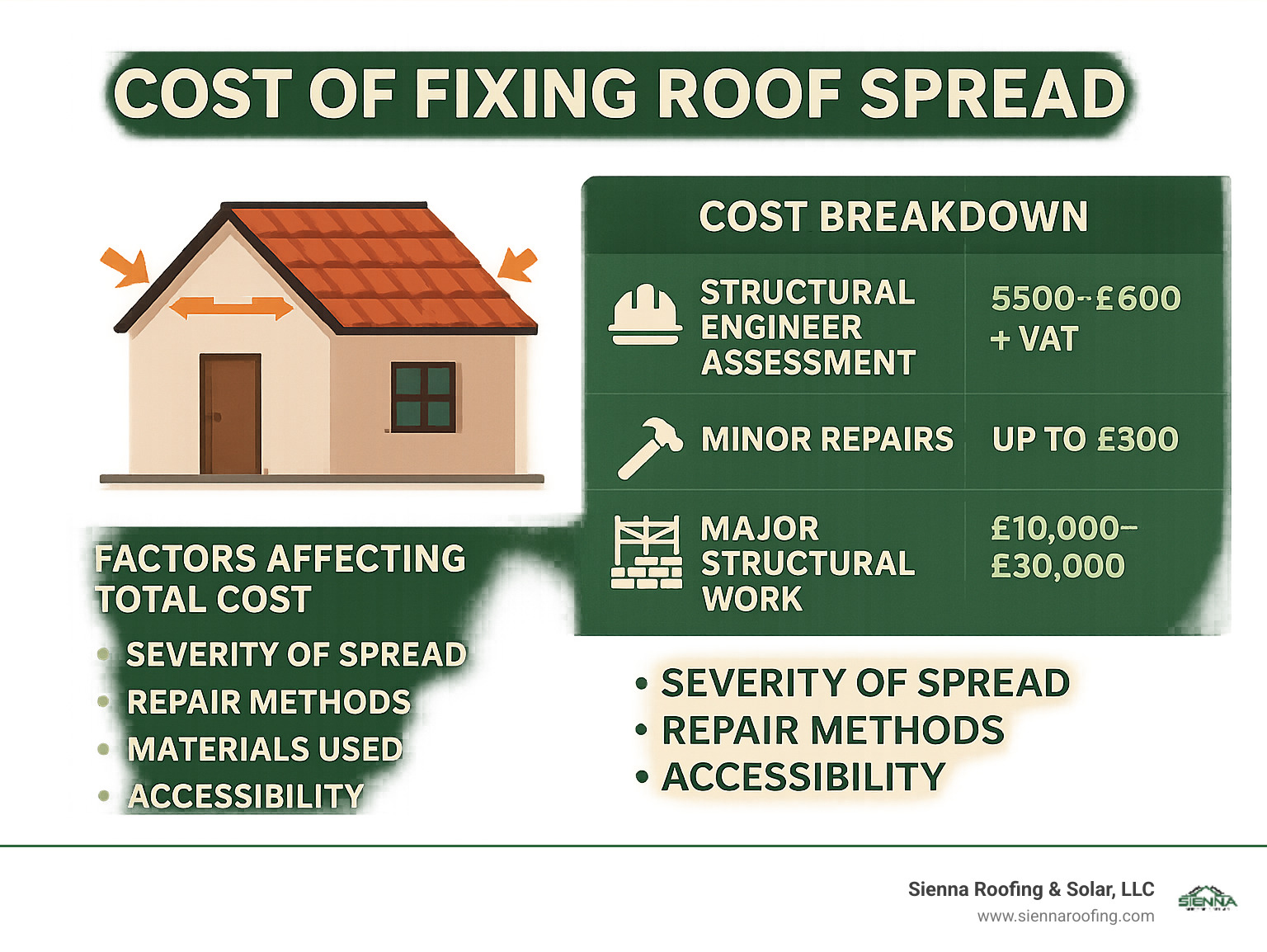
What Is Roof Spread & Why Does It Happen?
Picture your roof like a giant triangle sitting on top of your house. Roof spread happens when those timber rafters that form the triangle start pushing outward against your walls, creating what engineers call outward thrust. It's like when you lean a ladder against a wall - without something holding the bottom in place, physics wants that ladder to slide away from the wall.
Your home was built with a clever solution to this problem. Ceiling joists act like invisible chains, tying your walls together and preventing the roof from spreading them apart. When these ties fail or get removed during renovations, trouble starts brewing.
Here's where many homeowners unknowingly create problems: they replace their original slate roof with heavy tiles made of concrete. Those beautiful new tiles might look great, but they can weigh significantly more than what your roof was designed to handle. The extra weight creates more outward thrust, and suddenly your ceiling joists are fighting a losing battle.
Moisture rot is another silent destroyer. When water gets into the timber structure, it weakens the very components that keep your roof from spreading.
Common Causes in Modern Homes
We see three main problems repeatedly in Sugar Land and throughout the Houston area.
Retro-fit concrete tiles top our list of culprits. Many homeowners love the durability and appearance of modern concrete tiles, but they often don't realize these can be much heavier than the original materials. Your 1950s home might have been perfectly engineered for slate, but those new tiles create forces the structure wasn't designed to handle.
Undersized ceiling joists represent another common issue. Your ceiling joists might have been adequate when your house was built, but modern roofing materials, additional insulation, and decades of settling can push them beyond their limits.
Failed wall plates complete the trifecta of trouble. These horizontal timbers sit right on top of your walls, connecting the roof structure to the house. Years of moisture exposure, insect damage, or simple age can cause them to deteriorate.
Engineering Perspective
From a structural standpoint, roof spread is all about understanding load paths- how forces travel through your home's structure. Your roof creates two types of forces: vertical loads that push straight down (which walls handle easily) and horizontal thrust that pushes outward (which walls hate).
Rafter thrust calculations show that even a modest-sized roof can generate thousands of pounds of outward force. Add snow and wind uplift to the equation, plus the constant expansion and contraction from temperature changes, and you've got a recipe for structural problems if your tie system isn't up to the task.
Spotting the Problem Early: Signs, Risks & Consequences

The tricky thing about roof spread is that it doesn't happen overnight. It's a sneaky problem that develops gradually, giving you subtle hints before it becomes a major headache. Learning to recognize these early warning signs can literally save you thousands of dollars in repairs.
Cracks above bay windows are often the first red flag we see. These aren't just cosmetic issues - they're telling you that your walls are being pushed outward by the roof's weight. You might also notice horizontal cracks near the roofline or bowing in your exterior walls that wasn't there before.
Inside your home, doors and windows that suddenly stick or won't close properly often indicate structural movement. From the outside, loose or slipping tiles and sagging rooflines visible from the street are clear signs that your roof structure is under stress.
The consequences of ignoring these warning signs go far beyond a few cracks in the wall. While complete structural collapse is rare, we've seen homes where the cost of fixing roof spread jumped from a few hundred pounds to over £25,000 because the homeowner waited too long to address the problem.
Your insurance company won't be thrilled either. They're increasingly scrutinizing roof spread claims, especially when the damage stems from modifications like switching to heavier roofing materials. Plus, potential buyers will spot structural issues during home inspections, which can seriously impact your property's resale value.
If you're noticing any of these warning signs, our comprehensive roof inspection service can help identify problems before they become expensive disasters.
DIY Checks Before You Call the Pros
While we always recommend getting professional eyes on your roof, there are some basic checks you can do yourself to assess whether you might have a developing problem.
The attic daylight test is surprisingly effective. Head up to your attic during the day and look for daylight creeping in where it shouldn't be. This often indicates structural movement that's created gaps in your roof system.
Measuring wall spread with a tape measure can reveal problems too. Measure the distance between opposite walls at several points - if you find significant variations, it could mean your walls are moving outward.
For scanning your roofline, grab a pair of binoculars and examine your roof from across the street. Look for sagging areas, uneven lines, or sections that just don't look quite right compared to neighboring homes.
Dangers of Ignoring Roof Spread
Here's where things get expensive fast. Roof spread creates a domino effect of problems that compound over time. When your walls start moving, you get secondary masonry damage as bricks crack and mortar joints fail.
Water ingress becomes inevitable as structural movement creates gaps where rain can enter. Once water gets in, you're looking at rot in your timber, mold growth, and damaged insulation. We've seen homeowners face mold remediation costs alone ranging from $1,000 to $3,500 - and that's before even touching the structural repairs.
The cruel reality is that a £500 repair today can become a £25,000 nightmare if you wait. Roof spread doesn't fix itself, and every month you delay makes the problem worse and more expensive to solve.
Professional Assessment & Repair Methods
Suspect roof spread? Call a structural engineer first. For £500–£600 + VAT, you get calculations, repair specs, and the paperwork insurers and building control demand. Their report prevents guess-work and costly do-overs.
Who Does What & Typical Fees
- Structural engineer – £500–£600 visit and report
- Specialist builder – £45–£55 /hr for quotes or small fixes
- Experienced roofer – £300–£500 /day for roof-only issues
- Building permits – £150–£300, required for structural changes
Common Repair Options & Price Ranges
| Repair | When It’s Used | Typical Cost | Added Lifespan |
|---|---|---|---|
| Extra joist restraint (metal straps, noggins) | Early spread, joists sound | £200–£500 | 20+ yrs |
| Strengthen rafter feet | Rafter-to-wall joint weak | £300–£800 | 25+ yrs |
| Steel tie rods | Walls already moved | £2,000–£8,000 | 50+ yrs |
| Re-slate roof (swap heavy tiles for slate) | Heavy concrete tiles caused spread | £10,000–£25,000 | 75+ yrs |
Why Material Choice Matters
Original slate weighs roughly 600–800 lb per 100 sq ft; concrete tiles can top 1,200 lb. If your 1930s rafters were sized for slate, that extra tonnage magnifies outward thrust. In many cases, reverting to slate is cheaper long-term than endlessly reinforcing timber.
For further guidance on typical roof repair costs, see this detailed resource from This Old House.
Detailed Costs: The True Cost of Fixing Roof Spread
Prices vary by how early you act and local labor rates around Sugar Land, Katy, and the wider Houston area. We’ve handled projects from a quick £300 strap-tie job to a £30,000 full rebuild.
Scaffolding alone can add about £625 per week, so speed matters.
Minor Fixes: Under £1,000
- Strap ties: £150–£300 – fasten ceiling joists to wall plates.
- Extra noggins: £200–£400 – timber blocks to stiffen the ceiling grid.
- Local bay repair: £300–£800 – only if damage is isolated.
Most of these take one–two days and stop early spread cold.
Major Structural Repairs: £10k–£30k
- Full steel tie system: £5,000–£15,000 – pulls walls back and prevents future movement.
- Re-slating plus structural upgrades: £15,000–£25,000 – removes heavy tiles, upgrades timber, installs slate.
- Wall crack stitching / masonry rebuild: £2,000–£8,000.
- Bay window rebuild: £3,000–£12,000.
Hidden & Additional Expenses
- Engineer sign-off visit: £200–£400.
- Mold remediation: £500–£4,000 if water found a way in.
- Weather protection during works: £300–£1,000.
- Interior make-good (plaster, paint, floors): £1,000–£5,000.
Need both structure and weatherproofing addressed? Our roofing repair team handles the full scope so there are no surprise costs later.
Preventing Future Roof Spread & Choosing Your Contractor
The best way to avoid the cost of fixing roof spread is preventing it from happening in the first place. After five years of working with homeowners across Sugar Land and the greater Houston area, I've learned that a little prevention saves thousands in repairs down the road.
Regular maintenance is your first line of defense. Annual professional inspections catch early warning signs before they become expensive problems. During these inspections, we look for subtle changes in wall alignment, new cracks, or signs that your roof structure is under stress.
Proper ventilation keeps your roof structure healthy. Adequate attic ventilation prevents moisture buildup that can rot ceiling joists and wall plates. When these structural connections weaken, your roof loses its ability to tie the walls together effectively.
Don't overlook your gutters either. Clean, properly functioning gutters prevent water damage to the critical connection points between your roof and walls. Water damage to wall plates is one of the leading causes of roof spread in older homes.
When it's time to replace roofing materials, choose wisely based on your home's structural capacity. Not every roof can handle the weight of modern concrete tiles. Sometimes sticking with the original slate specification is the smartest long-term investment.
Vetting Checklist
Choosing the right contractor for roof spread repairs is crucial - this isn't the time to go with the lowest bidder. Poor workmanship can make structural problems worse and potentially void your insurance coverage.
Start with professional credentials. Look for contractors with NRCA membership or equivalent certifications. These organizations require ongoing education and adherence to industry standards.
Verify insurance coverage thoroughly. Don't just ask - request certificates for both liability insurance and workers' compensation. A contractor working on structural repairs without proper coverage puts you at serious financial risk.
Check recent local references and actually call them. Ask specific questions about work quality, timeline adherence, and how well the contractor communicated throughout the project.
Insist on a detailed written scope that addresses both immediate repairs and long-term prevention strategies. Vague estimates lead to cost overruns and incomplete work.
The contractor should understand local building codes and permit requirements. Structural repairs often require permits and inspections - make sure your contractor handles this properly.
Long-Term Benefits After Repair
Properly addressing roof spread pays dividends beyond just stopping structural damage. Improved safety is the most important benefit - you'll eliminate the risk of progressive structural failure that could endanger your family.
Your home's value gets a significant boost when structural issues are professionally resolved. Potential buyers and appraisers recognize the difference between a home with documented structural repairs and one with ongoing problems.
Many homeowners are surprised to learn that insurance premiums can decrease after major structural improvements. Some insurers offer discounts for homes with documented upgrades that reduce risk.
Perhaps most importantly, you'll have genuine peace of mind. No more worrying about whether that new crack means serious trouble, or wondering if your roof spread is getting worse. Professional repairs with proper warranties let you sleep soundly.
For guidance on coverage options, check whether insurance covers roof repair for your specific situation.
At Sienna Roofing & Solar, our 100% satisfaction guarantee means we stand behind every repair. We've built our reputation in the Houston area by treating every home like it's our own, ensuring repairs are done right the first time.
Frequently Asked Questions about Roof Spread Costs
When homeowners first find roof spread, they're often overwhelmed by the potential costs and complexity. These are the questions we hear most often during our initial consultations.
How much does a structural engineer's report cost?
You're looking at £500-£600 plus VAT for a comprehensive structural engineer's assessment. I know it feels like a big expense upfront, but this report becomes your roadmap for everything that follows.
The engineer will visit your property, assess the extent of the spread, and provide detailed calculations showing exactly what's happening structurally. More importantly, they'll specify the repairs needed to fix the problem properly.
Most insurance companies require this professional report if you're making a claim. Building control will also want to see it for any major structural work. Think of it as spending £600 to potentially save thousands on inappropriate repairs that don't address the root cause.
Is repairing roof spread cheaper than a full roof replacement?
This depends entirely on how far the problem has progressed and your roof's overall condition. The cost of fixing roof spread can range from a few hundred pounds to £30,000, while full roof replacement typically runs £15,000-£40,000.
Minor repairs under £1,000 make perfect sense if your roof is relatively new and the spread is caught early. You're essentially buying another 20+ years of roof life for a fraction of replacement cost.
Major structural repairs costing £10,000-£30,000 require more careful consideration. If your roof is already 20+ years old and showing other signs of wear, replacement might be the smarter long-term investment.
We always provide both repair and replacement quotes so homeowners can make informed decisions based on their specific situation and budget.
Can homeowner's insurance cover any part of the repair?
Insurance coverage for roof spread is complicated, and honestly, it's often disappointing for homeowners. Coverage depends heavily on what caused the spread and how it's documented.
Storm damage or sudden structural failure is typically covered. If you can show that a specific weather event caused the spread, you have a good chance of coverage. This is where having before-and-after photos and professional documentation becomes crucial.
Gradual deterioration or homeowner modifications are usually excluded. If the spread developed because you switched from slate to heavier concrete tiles, most insurers won't cover the repairs.
Here's what often works in your favor: If roof spread has caused secondary damage like cracked walls or damaged bay windows, those repairs might be covered even if the structural work isn't. The key is having a structural engineer's report that clearly documents the sequence of damage.
Always contact your insurance agent before starting any work. They can review your specific policy and advise on documentation requirements that might help your claim.
Conclusion

Understanding the cost of fixing roof spread doesn't have to be overwhelming. The key insight is simple: catching problems early can save you thousands of dollars and months of stress.
Think of roof spread like a small leak in your kitchen pipe. Fix it when you first notice the drip, and you're looking at a quick, affordable repair. Wait until water damage spreads through your walls and floors, and suddenly you're facing a complete renovation project.
The same principle applies here. Professional assessment costs £500-£600- a small investment that gives you the roadmap for addressing problems before they spiral out of control. Minor repairs under £500 can often prevent the need for major structural work costing £10,000-£30,000 or more.
We've seen too many homeowners who thought they could "wait and see" how their roof spread developed. Unfortunately, structural problems don't improve with time. What starts as a hairline crack above a bay window can become a major safety concern that affects your entire home's stability.
The good news? Most roof spread problems are completely fixable when addressed properly. Whether you need simple restraint improvements or comprehensive structural solutions, the right approach can restore your home's integrity and your peace of mind.
At Sienna Roofing & Solar, we understand that dealing with structural issues feels overwhelming. That's why we take a personal approach to every project, walking you through the process step by step. Our construction management background means we see the big picture - not just the immediate problem, but how to prevent future issues.
Our 100% satisfaction guarantee isn't just marketing speak. It reflects our commitment to getting your roof spread repair right the first time. We serve families throughout Sugar Land, Missouri City, Katy, Richmond, Pearland, and Rosenberg because we believe in building lasting relationships with our neighbors.
When major structural issues require complete roof system renovation, our roofing tear off & replacement services provide comprehensive solutions that address both immediate problems and long-term prevention.
Don't let roof spread rob you of sleep or savings. The sooner you address warning signs, the more options you'll have and the less you'll spend. Contact us today for a professional assessment - your future self will thank you for taking action now rather than hoping the problem goes away on its own.




